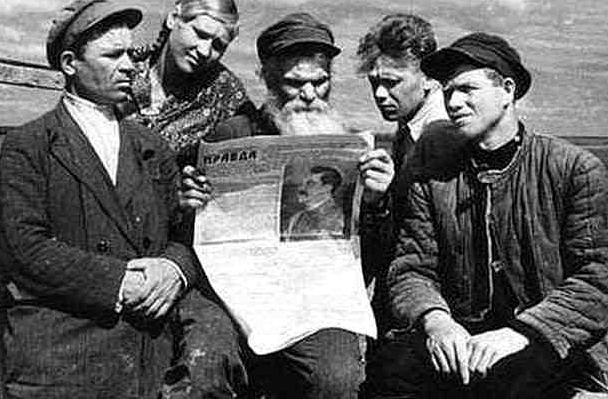
I have won two Robert F. Kennedy Journalism Awards, been a Pulitzer Prize finalist, published more than 20 books and have seen my political cartoons and columns appear in hundreds of newspapers and magazines. So why do I have Russian state media as one of my clients?
I’m on Sputnik News’ website—as a freelancer, not on staff—and a frequent guest on its radio feed for the same reason that former New York Times war correspondent Chris Hedges and former MSNBC talk host Ed Schultz appeared on the now-shuttered RT America television network:
I’m a leftist.
It’s an article of faith that the United States is a conservative country. But 38% of American voters prefer socialism to capitalism. That’s a remarkable figure considering this country’s history of suppressing the Left from the Palmer raids to McCarthyism to the methodical legislative destruction of trade unionism.
The American Left is bigger than you may think, and it’s growing. Yet leftist voices—antiwar, anti-capitalist, militantly environmentalist—are nowhere to be found in the mainstream, corporate-owned print, broadcast and online news media outlets consumed by the vast majority of U.S. citizens.
It doesn’t matter how entertaining or relevant or smart or funny you are. Communists, socialists, anarchists, left libertarians, deep-green environmentalists and populist progressives need not apply as opinion columnists, radio or television commentators. There isn’t even space in mainstream media for pundits who align with establishment progressives like Senators Bernie Sanders and Elizabeth Warren, whose ideas are indistinguishable from old-school liberal Democrats like Hubert Humphrey and George McGovern.
Fortunately, some leftists found a home on RT or Sputnik. Conservative critics often accused them of being mouthpieces for the Russian government. But that’s not my experience of the Americans I know. They had their own opinions and found a platform where those opinions were welcome.
Working for Sputnik puts a target on your back. Even though I’m not on staff, Twitter and Facebook label links to my Sputnik cartoons as Russian state media. And in the current atmosphere of hysteria over the Russia-Ukraine war to which the U.S. isn’t even a party, reactionaries tar me with that 1950s Cold War classic, guilt by association. Just this week, for example, another cartoonist had the nads to call me “a traitor to American ideals and to democracy,” “Putin’s puppet, a Kremlin propagandist, and a useful idiot.” If this were the 18th century, I’d demand satisfaction from the cur.
Useful idiot, of course, is an insult popularized by fascists during McCarthyism. It is still used by the extreme right.
I’m curious: what would this neoconservative, who was in favor of invading both Afghanistan and Iraq and now wants another stupid war in Ukraine, have people like me do? Sit in silence forever?
Apparently, yes. If you’re on the “actual left,” with a worldview influenced by Marxist class analysis rather than identitarianism, no amount of talent or popularity will get you on the airwaves or into “respectable” print. Until last week, if you were a lucky leftist, you’d be invited to host a show on RT or appear as a guest, where—unlike on CNN, MSNBC or Fox—you’d be treated with respect, asked intelligent questions and given time to answer them.
Is it really possible that there are no insightful communist economics experts? No funny socialist editorial cartoonists? No sharp, telegenic, anarcho-syndicalist TV commentators? Of course such mythical creatures exist—they appeared on RT and, before it was deplatformed by Comcast and DirecTV in 2016, Al Jazeera America. The real reason for the Left’s lack of representation in mainstream media, one suspects, is ideological discrimination.
If “democracy dies in darkness,” as The Washington Post’s motto reads, why not allow all ideas to be discussed openly?
Even cable TV’s most “liberal” channel refuses to air content to the left of the center of the Democratic Party. MSNBC fired left-leaning political talk host Phil Donahue in February 2003, at the peak of the build-up to the invasion of Iraq even though he had the highest ratings of any program on the network. Bosses blamed production costs. But an internal MSNBC memo worried that Donahue presented a “difficult public face for NBC in a time of war,” and provided “a home for the liberal antiwar agenda at the same time that our competitors are waving the flag at every opportunity.”
“They were terrified of the antiwar voice,” Donahue recalled.
Twelve years later MSNBC fired feisty pro-worker talker Ed Schultz. He claimed that they fired him for insisting upon covering Bernie Sanders’ 2015 campaign launch speech. “You’re not covering Bernie Sanders,” network president Phil Griffin ordered Schultz.
“I think that they were in the tank for Hillary Clinton, and I think that it was managed, and 45 days later I was out at MSNBC,” Schultz who died in 2018, remembered. Like other exiled lefties, Schultz landed at RT. “There was more oversight and more direction given to me on content at MSNBC than there ever has been here at RT,” he added.
RT’s diverse team of commentators wasn’t limited to leftists. The roster included Hedges, WikiLeaks founder Julian Assange, former Minnesota governor Jesse Ventura, “Star Trek” actor William Shatner, ex-CNN host Larry King, leftist comedian Lee Camp and right-wing pundits Dennis Miller and Steve Malzberg. Guests included academic experts, political activists and politicians like former Green Party presidential candidates Ralph Nader and Jill Stein, both of whom were marginalized by U.S. news media and denied spots in presidential debates.
The small sliver of American viewers who gave RT a chance encountered excellent production values and high-quality news and opinion programs that didn’t talk down to the audience. RT was unpredictable, entertaining and frequently more engaging than the three major cable news channels. It was nominated for five Emmys.
Critics of RT and Sputnik, however, have complained that RT shines a spotlight on schisms in U.S. politics and society, for example “push[ing] divisive racial narratives, including stories emphasizing allegations of police abuse in the United States and highlighting racism against African-Americans within the military,” as The New York Times wrote in 2020. Since when, however, is the U.S. or any other government entitled to positive news coverage? If racism makes America look bad, don’t eliminate coverage of racism—eliminate racism.
Opponents also deride RT and Sputnik’s news coverage as Russian government propaganda. Which is, of course, objectively subjective.
On RT/Sputnik as on other outlets, bias is largely a matter of omission. In my experience what runs on Sputnik is fact-checked. But it shouldn’t be anyone’s go-to source for criticism of Russian President Vladimir Putin, any more than you should look to MSNBC for harsh takes on Joe Biden or Fox for sharp attacks on Donald Trump. One could argue, and many on the Left have, that “respectable” American news outlets have frequently worn their biases on their sleeves often, and are often accused of disseminating propaganda. The absence of thoughtful antiwar voices during false WMDs claims during the run-up to the invasion of Iraq and denying coverage to Bernie Sanders come to mind.
RT America shut down last week after it was deplatformed by Roku, DirecTV and cable networks in response to Russia’s invasion of Ukraine. Before it went dark on television, it had earned a sizable online audience. In 2013 the channel became the first to reach 1 billion views on YouTube, numbers driven in part by its willingness to cover third-party candidacies that no one else would touch and round-the-clock reporting on the Occupy Wall Street movement.
The leftist Australian blogger Caitlyn Johnstone has frequently remarked that RT America and Sputnik News would have become instantly unviable had left-leaning voices been invited onto mainstream American media outlets. “There’s this bizarre, stupid notion people have accepted that socialist and antiwar voices should never allow Russian media to platform them, and should instead wait until they are given a large platform by Western mainstream media, and keep waiting, and waiting, and just keep on waiting until we all die in a nuclear holocaust,” Johnstone wrote. “If you have something important to say and you know it’s a true and helpful message, then it doesn’t matter if it’s the Russian government who’s giving you your platform or anyone else, because the message itself is intrinsically valuable.”
I agree. When I tell friends that I’m on Sputnik News, an online radio service and news site accessible via the web and therefore less vulnerable to Ukraine-related cancellation in the United States than in Europe, where it is banned, some cock their heads and give that “Really?” expression. Those who check it out are impressed, surprised that the overall tenor of discussion is smarter and sharper than, say, NPR. Sputnik is still operational, with 57 million visits online in the last month. They grant me a platform for my ideas, which are discussed by an appreciative, well-informed audience. They don’t censor me. And they pay.
Until the revolution destroys capitalism, leftists must compromise their principles in order to survive. I’ve never been published by a media organization with which I shared all of my political ideals. As a realist with bills to pay, where would I find a media organization with which I share most of my political ideals? I disagree with Sputnik about various issues; I also disagree with NPR and even with Jacobin, the socialist magazine.
I would work for pretty much any media outlet that doesn’t constrain my freedom of expression beyond what I consider reasonable limits. (Sputnik has never told me what to say, which is more than I can say for many of my other clients.) But over the past 20 or so years, the media has been turning farther and farther to the right. Left voices, especially before 9/11, were occasionally allotted space alongside liberal Democrats on the opinion pages. I was one of them. Leftists sometimes appeared on cable news television. Again, I was one of them. So was Rachel Maddow. She survived, and thrived, by moving right into mainstream liberalism.
That tiny sliver of openness has vanished. Anti-interventionists rarely if ever—I would say never, but I can’t watch 24-7—appear on those panels of talking heads who discuss foreign policy crises; the acceptable range of discussion runs from pro-interventionist to more pro-interventionist. When is the last time you heard anyone on cable news suggest that the U.S. ought to stay out of an overseas hot spot entirely, that it’s not our business?
All the Left needs for a fair shot at readers and viewers is one angel investor. But millionaires tend to dislike socialism. George Soros, bête noir of the right, funds Democrats, not lefties.
This piece was submitted to The New York Times and The Washington Post. Both rejected it.
For leftists, Sputnik is still one of the few games in town.
(Ted Rall (Twitter: @tedrall), the political cartoonist, columnist and graphic novelist, is the author of a new graphic novel about a journalist gone bad, “The Stringer.” Order one today. You can support Ted’s hard-hitting political cartoons and columns and see his work first by sponsoring his work on Patreon.)



